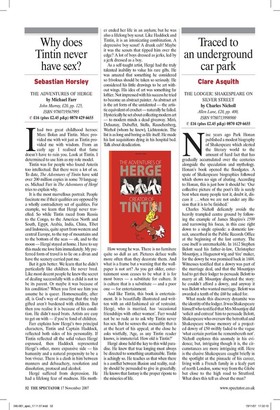Why does Tintin never have sex?
Sebastian Horsley THE ADVENTURES OF HERGE by Michael Farr John Murray, £20, pp. 125, ISBN 9780719567995 £16 (plus £2.45 p&p) 0870 429 6655 Ihad two great childhood heroes: Marc Bolan and Tintin. Marc provided me with wit just as Tintin provided me with wisdom. From an early age I realised that fame doesn't have to ruin you. Look at Tintin. I determined to use him as my role model.
Tintin was for people who found Asterix too intellectual. But there were a lot of us. To date, The Adventures of Tintin have sold over 200 million copies in some 70 languages. Michael Farr in The Adventures of Herge tries to explain why.
It is the most marvellous portrait. People fascinate me if their qualities are opposed by a wholly contradictory set of qualities. For example, we learn that Herge never travelled. So while Tintin raced from Russia to the Congo, to the Americas North and South, Egypt, Arabia, India, China, Tibet and Indonesia, quite apart from western and central Europe, to the top of mountains and to the bottom of the seas — oh, and to the moon — Herge stayed at home. I have to say this made me love him immediately. My preferred form of travel is to lie on a divan and have the scenery carried past me.
But it gets better. We learn that he didn't particularly like children. He never bred. Like most decent people he knew the secret of dealing successfully with a child is not to be its parent. Or maybe it was because of his condition? When you first see him you assume he is queer. Homosexuality, after all, is God's way of ensuring that the truly gifted aren't burdened with children. But then you realise it is because of his condition. He didn't need brats. Artists are easy to get on with — if you're fond of children.
Farr explains how Herges two principal characters, Tintin and Captain Haddock, reflected both sides of his personality. If Tintin reflected all the solid values Herge espoused, then Haddock represented Herge's other, more expansive side — his humanity and a natural propensity to be a bon viveur. There is a clash in him between manners and debauchery, resolution and dissolution, protocol and alcohol.
Herge suffered from depression. He had a lifelong fear of madness. His mother ended her life in an asylum; but he was also a lifelong boy scout. Like Haddock and Tintin, it is an intoxicating combination. A depressive boy scout! A drunk cub! Maybe it was the scouts that tipped him over the edge? A lot of boys dressed as jerks, led by a jerk dressed as a boy.
As a self-taught artist, Herge had the truly talented inability to value his rare gifts. He was amazed that something he considered so frivolous should be taken so seriously. He considered his little drawings to be art without wings. His idea of art was something far loftier. Not impressed with his success he tried to become an abstract painter. As abstract art is the art form of the untalented — the artistic equivalent of crochet — naturally he failed. Hysterically he set about collecting modern art — to modern minds a dead giveaway. Miro, Delaunay, Dubuffet, Stella, Rauschenberg, Warhol (whom he knew), Lichtenstein. The list is as long and boring as life itself. He made his last acquisitions dying in his hospital bed. Talk about deadication.
How wrong he was. There is no furniture quite so dull as art. Pictures deface walls more often than they decorate them. And what is a frame but a warning that the wallpaper is not art? As you get older, entertainment soon ceases to be what it is for most bores — a substitute for culture. It is culture that is a substitute — and a poor one — for entertainment.
And like Tintin, this book is entertainment. It is beautifully illustrated and written with an old-fashioned air of restraint. Herge, who is married, has 'occasional friendships with other women'. Farr would not be so rude as to ask why Tintin never has sex. But he senses the asexuality that is at the heart of his appeal; at the close he asks wistfully, 'Age, as any Tintin reader knows, is immaterial. How old is Tintin?'
Herge alone held the key to this wild paradise. He knew that true longing must always be directed to something unattainable. Tintin is achingly so. He teaches us that when there is a conflict between illusion and reality, reality should be persuaded to give in gracefully. He knows that fantasy is the proper riposte to the miseries of life.




































































 Previous page
Previous page